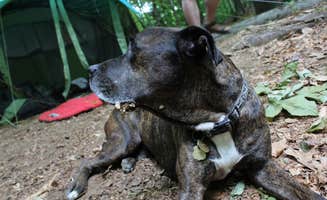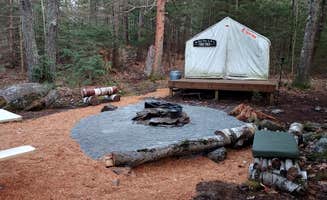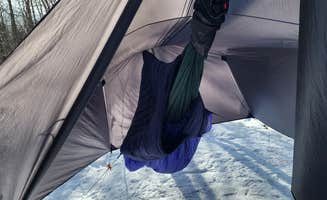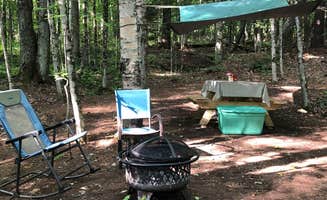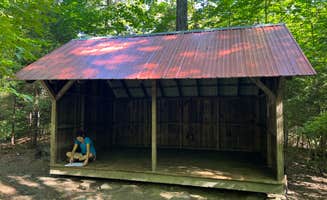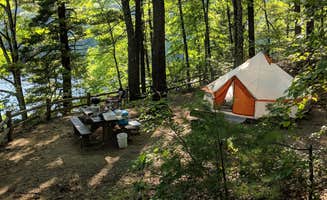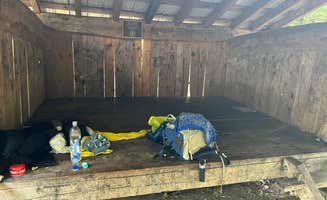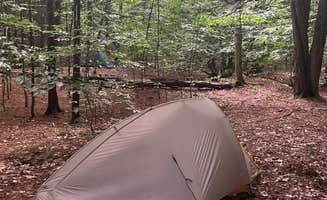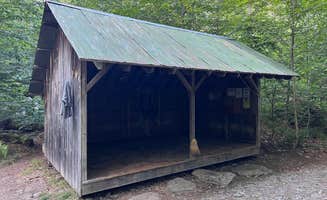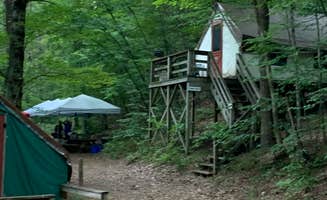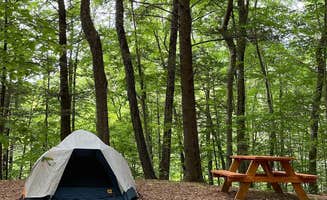Tent camping near Alstead, New Hampshire offers secluded wilderness experiences in the forests of southwestern New Hampshire and neighboring Vermont. Most backcountry sites in this region sit at elevations between 1,200 and 2,500 feet, creating cool summer nights even when valley temperatures remain warm. Several locations require seasonal water treatment due to high bacterial counts during summer months.
What to do
Paddle the islands: At Tully Lake Recreation Area, visitors can rent canoes and kayaks to explore the lake's numerous islands. "We take our canoe and spend the whole day at the lake. You can find lots of private areas to swim, pick blueberries and relax," notes Ben P.
Hike to mountain views: The Cardigan Campsites provide access to Mount Cardigan's challenging but manageable trails. "Great spot to spend the night before a climb of Mt. Cardigan! The climb is challenging but shouldn't take too long. Great fire tower views at the top too!" shares Madison G.
Walk to waterfalls: Multiple water features surround tent camping areas near Alstead. "If you'd like to hike with children, there is an easy hike close to the entrance, along Doane's Falls, a series of 5 waterfalls along an ascending path through a wooded area," notes Nancy R. about Tully Lake.
What campers like
Privacy between sites: Tully Lake Recreation Area offers significant separation between campsites. "The campsites are spacious and though there is not a bad site, some are better suited for certain purposes like group camping. Each site has a table and a fire ring," explains Miguel B.
Vehicle-free camping: Many tent sites require short walks from parking areas, creating quieter environments. "No cars at all at the campsites, which was great for peace of mind as our toddler roamed around. It also made for a super quiet stay," shares Megan G.
Natural water access: Maple Ridge Farm and other sites feature swimming areas directly from campsites. "Very lush campground, plenty of space and privacy between sites. They'll drive you in an ATV up to some of the sites that are further away from the parking lot," notes Les R.
What you should know
Cart systems for gear transport: Many campgrounds provide equipment to help move camping supplies. "Large wooden wheelbarrows are provided to bring your gear to your camp site. (This means no noise or disturbances from cars entering your camp sites)," explains Nancy R. about Tully Lake.
Variable bathroom facilities: Amenities range widely across tent camping areas. "There is one central restroom with showers (bring your quarters) and a place to wash dishes. The camp's minimal store sells ice cream and a (very) few sundries, so come prepared," advises Miguel B.
Seasonal insect activity: Lost Boys Hideout and other regional sites experience heavy bug pressure in early summer. "Nice new tents provided at Sleepy Hollow site. Improvements to the firepit, area all mulched, even some games and water are provided!" reports Steve K.
Tips for camping with families
Consider site distance from facilities: When camping with children, bathroom proximity matters. "Our site was fairly far from services, long run with small kids in the middle of the night. Not our favorite place, but to be fair mostly based on our site and neighboring campers," cautions Lauren A. about Tully Lake.
Pack minimal gear: The cart system works best with streamlined equipment. "The sites near the water or on bluffs are further away, and though they provide carts the trails can make hauling them tough. Keeping gear to a minimum is a good idea," recommends Miguel B.
Plan for limited connectivity: Winturri Backcountry Shelter and most wilderness tent sites have little to no cell service. "The shelter was fairly standard but this stop had a great amount of tent camping around in spaces with decent privacy," notes Justin P.
Tips for RVers
Consider tent-only alternatives: Most campgrounds near Alstead accommodate tents exclusively, with few RV options. "This is a 'Carry In' campground. You park at the entrance, register with Ranger. Large wooden wheelbarrows are provided to bring your gear to your camp site," explains Nancy R.
Use overflow parking areas: Stratton Pond Shelter and similar wilderness sites have limited vehicle parking. "The shelter is a 3.75mi hike from the nearest parking lot in winter. There are 2 tent platforms, 2 outhouses and at least 16 bunk spaces in the shelter," notes Miccal M.
Pack portable water containers: Many tent sites require carrying water from central locations. "Water was running when I was there in mid-August from a spring close to the shelter," reports Justin P. about Winturri shelter, highlighting the need to transport water at most backcountry locations.


